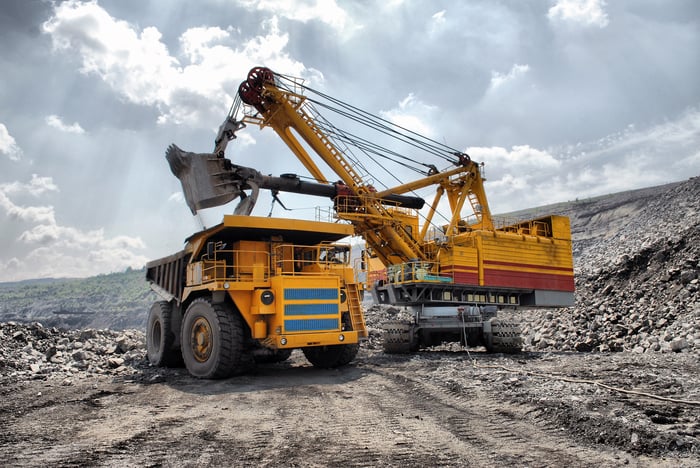Wall Street is a money machine over the long run. But when examined over shorter time frames, it's a roll of the dice. Over the past 16 months, bears have reigned supreme, with the Dow Jones Industrial Average, S&P 500, and Nasdaq Composite all entrenched in a bear market at some point or another.
When things become uncertain on Wall Street, investors tend to turn to the safety provided by dividend stocks. Publicly traded companies that pay a regular dividend are usually profitable, have well-defined long-term growth outlooks, and are time-tested. Best of all, income stocks have historically crushed their non-paying peers in the return column over the long run.

Image source: Getty Images.
But not all dividend stocks are created equally. In a perfect world, income investors would net the highest yield possible and face little or no risk. However, reality shows that risk and yield typically correlate once a company hits high-yield status (4% and above). This means companies with supercharged dividend yields require some extra vetting by investors.
As we spring forward into a new month, three ultra-high-yield dividend stocks stand out as ripe for the picking. The following income stocks, with yields ranging from 8.4% to 13.4%, can all be bought hand over fist in May.
Antero Midstream: 8.4% yield
The first ultra-high-yield dividend stock that's begging to be bought in May is energy specialist Antero Midstream (AM -4.06%).
With the Federal Reserve now modeling a mild recession into its outlook for later this year, an energy stock in the oil or natural gas space is probably not a place you'd think to put your money to work. When U.S. economic activity shifts into reverse, it's not uncommon for oil and gas demand to fall, which adversely impacts the spot prices of energy commodities.
Thankfully, Antero Midstream is well protected from any spot-price volatility as a midstream operator. It's a natural gas energy middleman -- primarily for parent Antero Resources (AR -6.43%) -- that provides gathering, compression, processing, and water services in the Marcellus and Utica shale.
What tends to make midstream companies so special is the structure of their contracts with drilling companies. Antero Midstream's entire portfolio of contracts is fixed-fee. This type of contract completely eliminates the impact of inflation and spot-price volatility, while ensuring steady operating cash flow in any economic environment. Being able to accurately forecast its cash flow a year or more in advance is what gives management the confidence to spend capital on new projects, acquisitions, and its distribution, without any fear that it'll adversely impact profits.
One of the most exciting catalysts is having parent Antero Resources increase drilling on Antero Midstream-owned acreage. With the infrastructure already in place to support an uptick in drilling, Antero Midstream anticipates that 2023 (and future years) will feature a reduction in capital expenditures (capex) and an uptick in free-cash-flow generation. Not surprisingly, the company's first-quarter operating results featured a decrease in full-year capex and an increase in net income and free-cash-flow guidance.
While a recession could make things a bit bumpy for energy stocks, Antero Midstream and its juicy 8.4% yield are well insulated from any potential tumult.
Innovative Industrial Properties: 10.5% yield
A second ultra-high-yield dividend stock that can be confidently bought hand over fist in May is marijuana-focused real estate investment trust (REIT) Innovative Industrial Properties (IIPR 2.64%), which is better known as IIP. IIP's quarterly distribution has grown by 1,100% in less than six years.
IIP is like any other REIT, but with the aforementioned cannabis twist. It purchases medical marijuana cultivation and processing facilities with the intent of leasing these assets out for 10 to 20 years. While acquisitions tend to be its primary growth driver, IIP does have modest inflationary rental hikes built into its master-lease agreements for its 100-plus properties.
The biggest headwind for Innovative Industrial Properties is that, for the first time as a public company, it's contending with delinquencies. In February, only 92% of its rent was collected on time, which isn't ideal for a REIT. Then again, dealing with delinquencies is something that eventually happens to all REITs. All indications suggest IIP is reworking select master-lease agreements, moving leases to new tenants, or potentially divesting assets where rental streams are an issue. In short, these cash-flow issues are short-term in nature and not a game changer for its operating model.
There are two aspects to IIP's business that make it such an attractive investment. For starters, the entirety of its portfolio is triple-net leased (sometimes referred to as NNN-leased). Triple-net leases put the responsibility of property costs, such as insurance, taxes, maintenance, and utilities, entirely on the renter. Though this results in a lower monthly rental payment for IIP, it importantly removes any unexpected expenses from the equation. With a weighted average lease length of 15.3 years, IIP's cash flow should be highly predictable.
The other big catalyst for Innovative Industrial Properties is the lack of momentum for cannabis reform on Capitol Hill. President Joe Biden still has 20 months left in his term and he remains opposed to federally legalizing cannabis. As long as weed is illegal at the federal level, access to basic banking solutions will be spotty for multi-state operators (MSOs).
IIP has helped MSOs bridge this financing gap by purchasing properties with cash and immediately leasing them back to the seller. These sale-leaseback arrangements are putting cash into the pockets of MSOs and netting IIP long-term tenants.

Image source: Getty Images.
Alliance Resource Partners: 13.4% yield
The third ultra-high-yield dividend stock to buy hand over fist in May is none other than coal producer Alliance Resource Partners (ARLP -1.19%). Yes, another energy stock -- and a coal producer, at that.
With most developed countries wanting to reduce their carbon footprint, coal has been treated as the energy commodity on the outside looking in. Following the initial stages of the COVID-19 pandemic that saw energy commodity demand plummet, a couple of heavily indebted coal companies found themselves in deep trouble. Alliance Resource Partners was not one of those companies.
What's put coal back on the radar is the globally broken energy supply chain. Russia's invasion of Ukraine has compromised a key source for Europe's energy supply needs. Meanwhile, three years of capital underinvestment from global energy majors makes it virtually impossible to rapidly increase the supply of oil or natural gas. It's coal that's come to the rescue, and Alliance Resource Partners has enjoyed sky-high per-ton coal prices as a result.
But there's more to like here than just macroeconomic factors working in the company's favor. What Alliance Resource Partners has wisely done is price and commit volume years in advance when production and/or pricing is favorable.
As of late January, the company was forecasting a midpoint of 37 million tons of coal production for 2023. Approximately 94% of this year's output was already priced and committed at the time of its fourth-quarter report, with another 64% priced and committed for 2024. It's not uncommon for Alliance Resource to lock in production up to four years in advance. Locking in commitments now means highly predictable cash flow for years.
Historically, management tends to be quite conservative with its expansion efforts. Slow-walking production expansion has kept debt levels manageable. Instead of trying to dig itself out from a steep hole like many of its peers, Alliance Resource Partners had just $126.2 million in net debt as of the end of 2022.
Finally, the company is enjoying the benefits of revenue diversification. Acquisitions of oil and natural gas royalty interests have diversified Alliance Resource Partners' revenue stream and allowed it to take further advantage of the globally broken energy supply chain.
The stock's sub-4 price-to-earnings ratio, based on Wall Street's earnings estimates for 2023 and 2024, makes its shares a steal of a deal right now.



